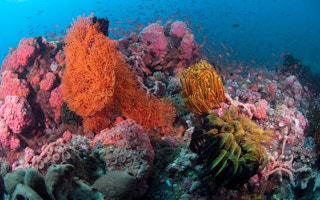International agencies and experts from all across Asia met in Bangkok on Tuesday to discuss ways of redefining national success by including the value of nature - the first high-level meeting of its kind for the region.
The workshop, titled ‘Valuing and Accounting for the Environment in the Asia Region’, calls for green accounting rather than the use of traditional gross domestic product (GDP) in Asia, where a significant portion of the world’s biological, cultural and economic diversity are found.
The three-day meeting aims to put a value on natural capital or the land, water, biodiversity and other resources in a country in order to prevent further misuse and depletion.
It is organised by United Nations Environment Programme (UNEP), United Nations Economic and Social Commission for Asia and the Pacific (UN ESCAP) and the South Asian Network for Development and Environmental Economics (SANDEE) among other international agencies.
Gordon Johnson, team leader for the Environment team of the United Nations Development Programme (UNDP) in Asia and the Pacific, said: “Traditional measures of productivity such as GDP have not served us well.”
“
Our world is heading toward a population of nine billion, with everyone aspiring to the lifestyle of a resident of a high-middle-income country. But environmental requirements of that scenario on a sustainable basis would require more than two Earths
Sir Partha Dasgupta, Cambridge University professor emeritus of Economics
“It is time to ask the question, ‘What is nature worth?’ It is no longer enough to merely ask, ‘How much money are we making?’” He added.
Since the 1950s, wealth accounting methodologies use the United Nations’ Systems of National Accounts (SNA), an internationally agreed standard to measure economic indicators.
These systems, however, rarely account for the worth of natural resources and ecosystem services, said UNEP. Numbers like GDP, which governments use in their national accounting, do not consider the breadth of the biodiversity in their territory.
This includes governments in Asian countries like China, India, Malaysia, Indonesia and the Philippines, which are five of the 17 megadiverse countries in the world, or nations that have more than two-thirds of the Earth’s biological wealth.
Sir Partha Dasgupta, professor emeritus of Economics at Cambridge University and keynote speaker of the conference, said, “Contemporary economic models give a misleading picture of the foundations of economic systems.”
“Our world is heading toward a population of nine billion, with everyone aspiring to the lifestyle of a resident of a high-middle-income country. But environmental requirements of that scenario on a sustainable basis would require more than two Earths,” he explained.
National accounting needs an alternative evaluation model, said Rikke Munk Hansen, UN ESCAP chief of Economic and Environment Statistics.
“The calls for valuing environmental assets and producing alternative measures of GDP underlines the necessity for governments to invest in statistics as a central part of sustainable development strategies,” she added.
One such methodology UNEP highlighted is the Systems of Environmental Economic Accounts (SEEA).
The SEEA is an international standard like the SNA, approved by the UN Statistical Commission last February 2012. It accounts for material natural resources such as minerals and timber, plus environmental protection expenditures, taxes and subsidies, according to WAVES or the Wealth Accounting and the Valuation of Ecosystem Services.
The latter is a global partnership started by former World Bank president Robert B Zoellick for sustainable development through the mainstreaming of green accounting in national economic accounts.
While their objective so far is to assist six to ten countries such as Botswana, Colombia, Costa Rica, Madagascar and the Philippines, they cite a list of natural accounting supporters which consist of numerous countries, companies, and civil society and international organisations like Citi, Nestlé, Wal-Mart, Unilever, Conservation International and the Bill and Melinda Gates Foundation.
This concept to account for natural capital has been gaining traction globally, with leading companies beginning to account for their use of ecosystem services in their annual and sustainability reports.
Based on the WAVES list, the countries supporting natural capital accounting in Asia are Egypt, Lebanon, the Philippines and Vietnam.
By implementing such a methodology or the SEEA, which assesses sectors like energy, water, fisheries, land and ecosystems, agriculture, the state of the environment is monitored vis-à-vis economic activities, helping governments and other organisations in their decision-making.
SANDEE executive director Priya Shyamsundar said, “The now internationally agreed SEEA Central framework and proposed Experimental Ecosystem Accounts have the potential to bring countries back on track to a more sustainable trajectory for development.”

















